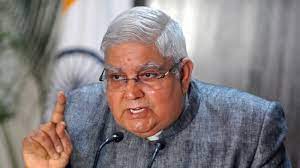
Government – Judiciary Tussle: VP Asks RS to “Actively Address” the Issue of Revival of NJAC
Manas Dasgupta
NEW DELHI, Dec 7: On the first day as the chairman of the Rajya Sabha, the vice-president Jagdeep Dhankhar on Wednesday again enlivened the tussle between the government and the judiciary over the appointment of judges calling upon the lawmakers to actively address the issue.
In his maiden address to the upper house in response to the felicitation he was accorded by all the parties on his election as the vice-president, Dhankhar said the historic National Judicial Appointment Committee (NJAC) Bill passed unanimously by Parliament in which the government had a say in judicial appointments, was “undone by the Supreme Court” by one order. He termed it a “severe compromise of parliamentary sovereignty and disregard of the mandate of the people.”
It is disconcerting that on “such a momentous issue, so vital to democratic fabric, there has been no focus in Parliament, now for over seven years… This House, in concert with the Lok Sabha, being custodian of the ordainment of the people, is duty bound to address the issue, and I am sure it will do so,” he said.
The NJAC bill, passed in 2015 gave the government a role in judicial appointments, which for two decades was the domain of the Supreme Court through the Collegium system. The law was challenged in court, with petitions contending that it would compromise the independence of judiciary. Thereafter, a Constitutional bench struck down the law, pointing to the Emergency of 1975-77, imposed by the then Congress government.
The court said it cannot be caught in a “web of indebtedness” to the government. Justice JS Khehar, who led the five-judge constitution bench, said, “The expectation from the judiciary, to safeguard the rights of the citizens of this country, can only be ensured, by keeping it absolutely insulated and independent, from the other organs of governance.”
Mr Dhankhar, who flagged the issue earlier as well, on Wednesday said “any incursion by one institution, in the domain of the other, has the potential to upset the governance apple cart.” Pointing out that the NJAC bill was passed with massive support, he said, “Contemporaneous scenario on this count is concerning and makes it imperative for us to follow the high standards set in the Constituent Assembly. We need to be cognizant of severe public discomfort and disillusionment at lack of decorum in the temple of democracy.”
Mr Dhankhar also tweeted the video clip of his address, with a series of strong remarks. On Friday, speaking at a function in presence of Chief Justice of India DY Chandrachud, Mr Dhankhar had criticized what he said was a lack of reaction from parliament when the Supreme Court struck down NJAC law.
The Vice-President’s comments come days after the Supreme Court signalled its displeasure about the government delay in signing off its choice of judges. “Once the Collegium reiterates a name, it is end of the chapter… It (the government) is crossing the Rubicon by keeping the names pending like this,” said a bench of Justices SK Kaul and AS Oka, while hearing a petition that alleged “wilful disobedience” of the court-mandated time frame on appointments. “Please resolve this and don’t make us take a judicial decision in this regard,” said the bench.
Over the last years, the government has repeatedly thumbs downed several names chosen for elevation by the Supreme Court. The last instance was last month, when the government refused to give a go-ahead to 10 names chosen for elevation by the Supreme Court. Union law minister Kiren Rijiju has made his stance on the matter clear, pointing out that prior to 1991, it was the government which picked judges. The current system was the outcome of a judicial order, which is “alien” to the constitution, he had said.
The Supreme Court recently had agreed to hear “at a later stage” a petition seeking revival of NJAC but the judiciary by and large had expressed the opinion that it disfavoured governmental interference in the judicial affairs including the appointment of judges in the high courts and Supreme Court.













